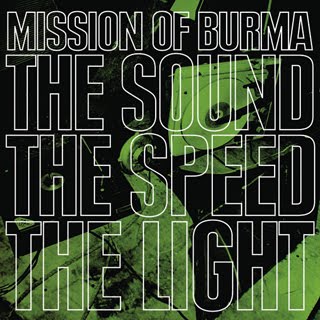
|
Mission of Burma
The Sound The Speed The Light
Conventional wisdom has it that band reunions are a pointless exercise in nostalgia, empty masturbation to please the hardcore fans and keep the ol’ bank balance ticking over. Conventional wisdom is wrong. Mission of Burma comprehensively debunked this theory by returning in 2002 after a 20 year hiatus with a stunning live show shortly followed by their triumphant comeback album ONoffON. Excellent, if slightly overlong, it was the appetiser for the delicious feast for the senses that was 2006’s The Obliterati, a twitchy metallic monster of an album that was every bit as essential as any of the work they’d produced in their prime. Now comes their third post-reunion album, The Sound The Speed The Light, and it’s a very different beast from anything they’ve done before. More subtle than their previous work, the album is divided into four sets of three songs, each conveying a different mood. The result is a slow, nuanced album that is far less immediate than its predecessors. You’d never guess this from the first song though. The absurdly titled ‘1, 2, 3, Partyy!’ careens out of the gate with wildly crashing drums and jagged punk guitar, grabbing the listener’s attention immediately with one of the catchiest, silliest songs Burma have written. Clint Conley’s lyrics are as wryly amusing as ever as he sets out to prove that despite their legendary reputation in po-faced indie circles Mission of Burma can on occasion be Very Funny Indeed. A more-or-less straightforward punk song, it’s a goofy opener to an album that really doesn’t follow its lead at all.
‘Possession’ starts off with Bob Weston’s wibbly wobbly tape loops playing over Roger Miller’s spiky, angular guitar and Peter Prescott’s military drumming before the song settles down to a juddering bass-heavy rhythm. The contrast between Conley’s sweet tuneful vocals and occasional desperate bellow works well in the context of the song, which seems to be about a possessive lover, although as ever it’s hard to tell what any Mission of Burma song is actually about. The band’s distinctive and unmistakeable sound is fully evident as the song takes several unexpected turns during its four and a half minute runtime, leaving the listener thoroughly pummelled by the end. The song segues smoothly into ‘Blunder’, which begins with serene guitar before exploding into a vintage Burma lurching riff over which Prescott, a man who could sing about adorable puppies and still sound like he wants a fight, hoarsely bellows his trademark cryptic punning lyrics. It’s an excellent song with some memorable lyrical imagery, proving that when it comes to straight-ahead punk rock songs the band haven’t slowed down at all. ‘Forget Yourself’ signals the beginning of the next set of songs and is slow, calm and tender. It’s the first real misstep of the album, the awkward clunky lyrics doing nothing to redeem a forgettable song. From here the album is infuriatingly uneven, zipping from fantastic songs that are the equal of anything the band wrote in their heyday to instantly forgettable exercises in blandness. For every glittering highlight like the beautiful melancholic tenderness of ‘Feed’, a song sung from the perspective of a jilted lover, the ornery grumpiness of the ironically named ‘Good Cheer’ or the belligerent hostility of ‘So Fuck It’ there’s a ‘Comes Undone’ or ‘One Day We Will Live There’ to balance out the awesomeness with blandness. The slower songs tend to meander past the listener without making any real impact, leaving it to the faster punk numbers to grab you by the scruff of the neck. It makes for a frustratingly uneven listen, making it impossible to recommend the album wholeheartedly. The album’s highlights make up for its failures, but only just, and for newcomers to Mission of Burma this really isn’t the best place to start. They’d be better off with ‘Signal, Calls, and Marches’ or ‘The Obliterati’ instead. The fact that Mission of Burma are still experimenting with their sound three albums in to their reunion instead of regurgitating their former glories is laudable and provides a template that more bands should follow. It’s just a shame that this time their attempts at experimentation haven’t been wholly successful.
|
